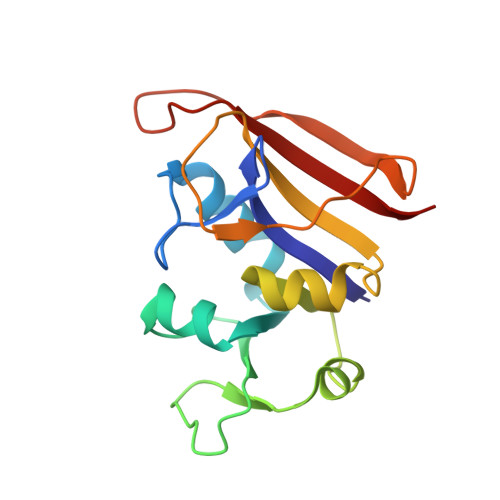Toward Broad Spectrum Dihydrofolate Reductase Inhibitors Targeting Trimethoprim Resistant Enzymes Identified in Clinical Isolates of Methicillin ResistantStaphylococcus aureus.
Reeve, S.M., Si, D., Krucinska, J., Yan, Y., Viswanathan, K., Wang, S., Holt, G.T., Frenkel, M.S., Ojewole, A.A., Estrada, A., Agabiti, S.S., Alverson, J.B., Gibson, N.D., Priestley, N.D., Wiemer, A.J., Donald, B.R., Wright, D.L.(2019) ACS Infect Dis 5: 1896-1906
- PubMed: 31565920
- DOI: https://doi.org/10.1021/acsinfecdis.9b00222
- Primary Citation of Related Structures:
6P9Z, 6PBO - PubMed Abstract:
The spread of plasmid borne resistance enzymes in clinical Staphylococcus aureus isolates is rendering trimethoprim and iclaprim, both inhibitors of dihydrofolate reductase (DHFR), ineffective. Continued exploitation of these targets will require compounds that can broadly inhibit these resistance-conferring isoforms. Using a structure-based approach, we have developed a novel class of ionized nonclassical antifolates (INCAs) that capture the molecular interactions that have been exclusive to classical antifolates. These modifications allow for a greatly expanded spectrum of activity across these pathogenic DHFR isoforms, while maintaining the ability to penetrate the bacterial cell wall. Using biochemical, structural, and computational methods, we are able to optimize these inhibitors to the conserved active sites of the endogenous and trimethoprim resistant DHFR enzymes. Here, we report a series of INCA compounds that exhibit low nanomolar enzymatic activity and potent cellular activity with human selectivity against a panel of clinically relevant TMP resistant (TMP R ) and methicillin resistant Staphylococcus aureus (MRSA) isolates.
- Department of Pharmaceutical Sciences , University of Connecticut , 69 N. Eagleville Road , Storrs , Connecticut 06269 , United States.
Organizational Affiliation:


















